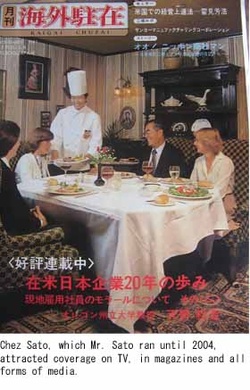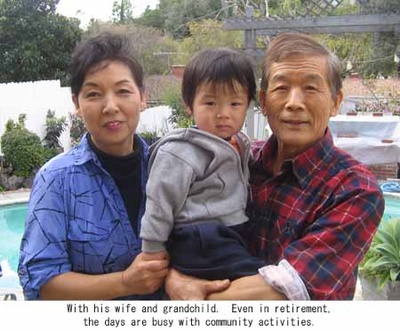>> Part 2
Having compiled a brilliant list of achievements as a French chef that would make anyone envious, the next goal for Mr. Sato was to have his own restaurant. “In the old days, most people didn’t open their own place once they became head chef at a good hotel or restaurant. But I had confidence in myself. When I decided to resign, everyone wondered why I would leave such a great place. But it was definitely my dream to have my own establishment, no matter how small. A dream is meaningless if you don’t make it a reality.”
With many loyal patrons, Mr. Sato fortunately soon found a sponsor. Not only that, even after leaving the Arco Tower, his former company told customers he was only on a leave of absence, hiding his resignation for an entire year. For a chef, it was an incredibly satisfying experience.
He set up shop in Arcadia, east of Los Angeles. It’s an area far removed from Santa Monica and the Mecca for restaurants, Beverly Hills. Plus, while they say restaurants are all about “location, location”, the place Mr. Sato selected was one with a history of store after store closing down, no matter what the type of business.
The name of the restaurant was “Chez Sato”. Mr. Sato’s European-grown; authentic French cuisine soon earned a stellar reputation.
“What was the secret of my success? It was probably the fact that I offered food tailored to Americans in America. Among Japanese people, even now Western cuisine still has an image of being for special occasions, like birthdays and Valentine’s Day. Among our American customers, we had people who came in daily.” Because Americans accepted it, the restaurant prospered. The branch manager of the local bank even told Mr. Sato “business would be even stronger if you’d just move to a better location.”
“I think one of the reasons I was so fortunate is that the customers liked me. You have to place importance on meeting people and communicating with them.” No matter how much glory or praise he got as a chef, or how successful he was in business, Mr. Sato never forgot to be appreciative.
That sense of appreciation is for an America that accepted him, and for his hometown of Kurobane in Tochigi Prefecture. Mr. Sato participated in the launching of an exchange student program between the East San Gabriel Valley Japanese Community Center and Kurobane. It originated about 15 years ago when then-Deputy Prime Minister Michio Watanabe visited the U.S. To welcome the Deputy Prime Minister, who came from Tochigi, he set up a “kenjinkai” (prefectural association), which hadn’t existed before then. As a chef who had succeeded in America, Mr. Sato also gave a speech in Kurobane at the “Human and Cultural Development Lectures.”
Addressing the people of his hometown, the topic of his speech was “Even people from the countryside can achieve the American dream.”
Soon after that, Mr. Sato was asked to bring 14 junior high school students from Kurobane to the U.S. He put “Now Recruiting Host Families” flyers on the tables at his restaurant. In no time, he had the needed number of families.
“Among the hosts, there were people who had two Rolls-Royces. But we talked about how it wasn’t good for the kids to only see such luxury. A third-year junior high school student is in that stage where he or she is growing as a person. There were kids who said they wanted to study really hard and come back again.”
For many years, Mr. Sato has volunteered to provide holiday meals to retirement homes. He has also had a booth at the Tofu Festival and donated the proceeds to the public welfare foundation, Little Tokyo Service Center. And for the reconstruction of the East San Gabriel Valley Japanese Community Center’s Social Hall, his wife Yoshie, who is a singer, gave a charity concert and donated $20,000 in profits.
When he closed his store in 2004 after 24 years in business, 500 people got together for his retirement party. The city of Arcadia created “Chez Sato’s Day”. Even since retiring, he remains passionately involved with the Tochigi Kenjinkai. The anticipation of eating food prepared by Mr. Sato helps keep Kenjkai members active.
At the end of the interview, I asked Mr. Sato, “What has America given you?” “America is a place where, if you have talent, it will be recognized. Success isn’t about money. Success is that feeling of satisfaction you get for achieving your goals.” More than anything else, Mr. Sato’s warm smile attests to that eloquent truth.
(End)
©2009 Keiko Fukuda







